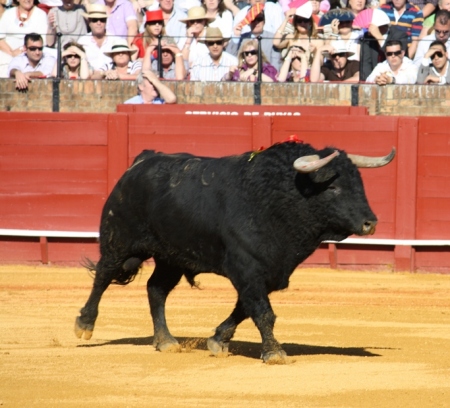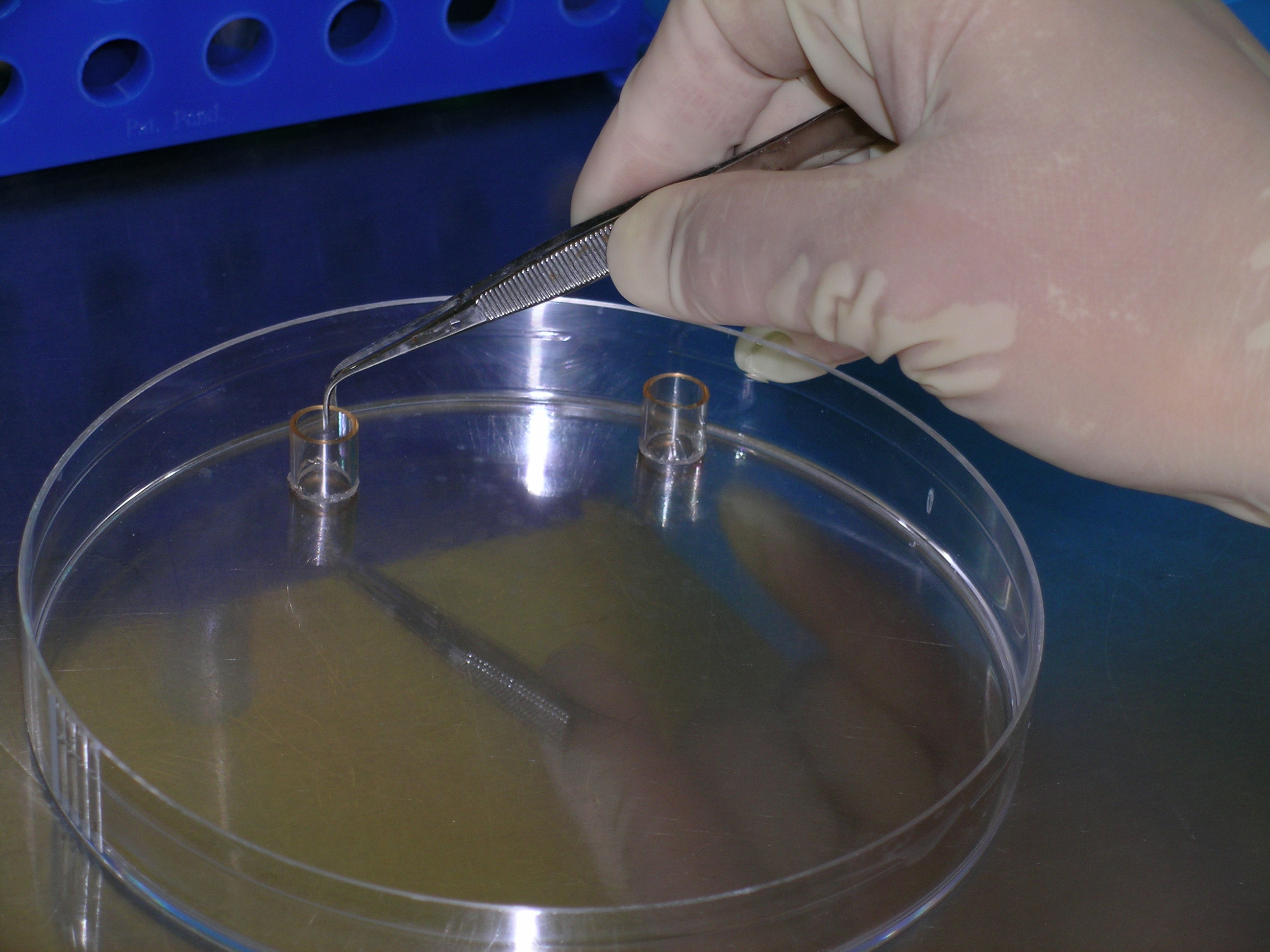|
Got (bull)
Got is the name of the world's first cloned fighting bull who was born on 18 May 2010 in Spain by a team from the Prince Felipe Research Center and the Valencia Foundation for Veterinary Research. He was cloned from another fighting bull named Vasito, and scientists are hoping that he displays similar fighting characteristics of his "father". The project of cloning Cloning is the process of producing individual organisms with identical or virtually identical DNA, either by natural or artificial means. In nature, some organisms produce clones through asexual reproduction. In the field of biotechnology, cl ... a fighting bull took three years, in part because scientist struggled with how to preserve "valuable bull genes". Although he is the first fighting bull cloned, Got is not the first ever bull cloned, that honor is believed to be bestowed on "Second Chance" who was born in 1999. References {{Bullfighting Cloned animals 2010 animal births Individual bulls in sport I ... [...More Info...] [...Related Items...] OR: [Wikipedia] [Google] [Baidu] |
Spanish Fighting Bull
The Spanish Fighting Bull (Toro Bravo, ''toro de lidia'', ''toro lidiado'', ''ganado bravo'', ''Touro de Lide'') is an Iberian Peninsula, Iberian heterogeneous cattle population. It is exclusively bred free-range on extensive estates in Spain, Portugal, France and Latin American countries where bull fighting is organized. Fighting bulls are artificial selection, selected primarily for a certain combination of aggression, energy, strength and stamina. In order to preserve their natural traits, during breeding the bulls rarely encounter humans, and if so, never encounter them on foot. History of the breed Some commentators trace the origins of the fighting bull to Aurochs, wild bulls from the Iberian Peninsula and their use for arena games in the Roman Empire.Fraser, Evan & Rimas, Andrew.Beef: The Untold Story of How Milk, Meat, and Muscle Shaped the World.'Harper Collins, London 2009 Although the actual origins are disputed, genetic studies have indicated that the breeding stock ... [...More Info...] [...Related Items...] OR: [Wikipedia] [Google] [Baidu] |
Spain
, image_flag = Bandera de España.svg , image_coat = Escudo de España (mazonado).svg , national_motto = ''Plus ultra'' (Latin)(English: "Further Beyond") , national_anthem = (English: "Royal March") , image_map = , map_caption = , image_map2 = , capital = Madrid , coordinates = , largest_city = Madrid , languages_type = Official language , languages = Spanish language, Spanish , ethnic_groups = , ethnic_groups_year = , ethnic_groups_ref = , religion = , religion_ref = , religion_year = 2020 , demonym = , government_type = Unitary state, Unitary Parliamentary system, parliamentary constitutional monarchy , leader_title1 = Monarchy of Spain, Monarch , leader_name1 = Felipe VI , leader_title2 = Prime Minister of Spain ... [...More Info...] [...Related Items...] OR: [Wikipedia] [Google] [Baidu] |
Cloning
Cloning is the process of producing individual organisms with identical or virtually identical DNA, either by natural or artificial means. In nature, some organisms produce clones through asexual reproduction. In the field of biotechnology, cloning is the process of creating cloned organisms (copies) of Cell (biology), cells and of DNA fragments (molecular cloning). Etymology Coined by Herbert J. Webber, the term clone derives from the Ancient Greek word (), ''twig'', which is the process whereby a new plant is created from a twig. In botany, the term ''lusus'' was used. In horticulture, the spelling ''clon'' was used until the early twentieth century; the final ''e'' came into use to indicate the vowel is a "long o" instead of a "short o". Since the term entered the popular lexicon in a more general context, the spelling ''clone'' has been used exclusively. Natural cloning Cloning is a natural form of reproduction that has allowed life forms to spread for hundreds of millio ... [...More Info...] [...Related Items...] OR: [Wikipedia] [Google] [Baidu] |
Cloned Animals
Cloning is the process of producing individual organisms with identical or virtually identical DNA, either by natural or artificial means. In nature, some organisms produce clones through asexual reproduction. In the field of biotechnology, cloning is the process of creating cloned organisms (copies) of cells and of DNA fragments (molecular cloning). Etymology Coined by Herbert J. Webber, the term clone derives from the Ancient Greek word (), ''twig'', which is the process whereby a new plant is created from a twig. In botany, the term ''lusus'' was used. In horticulture, the spelling ''clon'' was used until the early twentieth century; the final ''e'' came into use to indicate the vowel is a "long o" instead of a "short o". Since the term entered the popular lexicon in a more general context, the spelling ''clone'' has been used exclusively. Natural cloning Cloning is a natural form of reproduction that has allowed life forms to spread for hundreds of millions of years. I ... [...More Info...] [...Related Items...] OR: [Wikipedia] [Google] [Baidu] |
2010 Animal Births
1 (one, unit, unity) is a number representing a single or the only entity. 1 is also a numerical digit and represents a single unit of counting or measurement. For example, a line segment of ''unit length'' is a line segment of length 1. In conventions of sign where zero is considered neither positive nor negative, 1 is the first and smallest positive integer. It is also sometimes considered the first of the infinite sequence of natural numbers, followed by 2, although by other definitions 1 is the second natural number, following 0. The fundamental mathematical property of 1 is to be a multiplicative identity, meaning that any number multiplied by 1 equals the same number. Most if not all properties of 1 can be deduced from this. In advanced mathematics, a multiplicative identity is often denoted 1, even if it is not a number. 1 is by convention not considered a prime number; this was not universally accepted until the mid-20th century. Additionally, 1 is ... [...More Info...] [...Related Items...] OR: [Wikipedia] [Google] [Baidu] |
Individual Bulls In Sport
An individual is that which exists as a distinct entity. Individuality (or self-hood) is the state or quality of being an individual; particularly (in the case of humans) of being a person unique from other people and possessing one's own Maslow's hierarchy of needs, needs or goals, rights and moral responsibility, responsibilities. The concept of an individual features in diverse fields, including biology, law, and philosophy. Etymology From the 15th century and earlier (and also today within the fields of statistics and metaphysics) ''individual'' meant "divisible, indivisible", typically describing any numerically singular thing, but sometimes meaning "a person". From the 17th century on, ''individual'' has indicated separateness, as in individualism. Law Although individuality and individualism are commonly considered to mature with age/time and experience/wealth, a sanity, sane adult human, human being is usually considered by the State (polity), state as an "individu ... [...More Info...] [...Related Items...] OR: [Wikipedia] [Google] [Baidu] |



